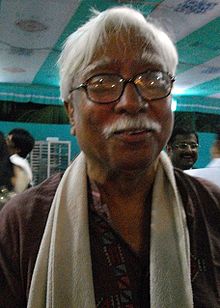| This article needs additional citations for verification. Please help improve this article by adding citations to reliable sources. Unsourced material may be challenged and removed. Find sources: "Mohammad Rafiq" poet – news · newspapers · books · scholar · JSTOR (August 2023) (Learn how and when to remove this message) |
| Mohammad Rafiq | |
|---|---|
 Rafiq in 2009 Rafiq in 2009 | |
| Native name | মোহাম্মদ রফিক |
| Born | (1943-10-23)23 October 1943 Baitpur, Bagerhat, Bengal Presidency, British India |
| Died | 6 August 2023(2023-08-06) (aged 79) Barisal District, Bangladesh |
| Occupation | Poet, academic |
| Nationality | Bangladeshi |
| Alma mater | Dhaka College University of Dhaka |
Mohammad Rafiq (23 October 1943 – 6 August 2023) was a Bangladeshi poet. He was awarded Bangla Academy Literary Award in 1987 and Ekushey Padak in 2010.
Early life
Rafiq was born on 23 October 1943 in the village of Baitpur, Bagerhat, Bangladesh (then India). His brother, Mohammad Tareque, was the secretary of Finance of Bangladesh. In his youth, his country was going through political instability. During his student life at Dhaka University, he was a political activist and was arrested and jailed twice. Pakistani martial law court sentenced him to ten years of hard labor. He later was released earlier to complete his university studies. During the War of Independence of Bangladesh, he served as a Sector-1 commander and motivated the freedom fighters. Later he worked with the Swadhin Bangla Betar Kendra.
Bangladesh and autocratic regime
"Through Mohammad Rafiq's dozen volumes of poetry, Bengali readers have witnessed not only the evolution of a distinctive personal vision and style but also a reflection of the changing fortunes of a homeland—all against a backdrop of a folk tradition (a typically Bengali mix of Hindu and Muslim lore) and timeless images of water and sky, sun and rain, clouds and dust. This is not to say that Rafiq's poems tend to be predominantly "political" (other poets of Bangladesh more regularly respond to specific events and issues). Rather, an awareness of Bangladesh's freedom struggle, the time of idealism and hope after independence, and the long dark period of military rule after the assassination of the new nation's first democratically elected leader, Sheikh Mujib Rahman, should help readers from less turbulent parts of the world understand the potentially explosive impact of a particular literary work and the extraordinary risks that a writer may take in writing and publishing it. When Hossain Muhammad Ershad—a dictator who fancied himself a poet—seized power in 1982, the people of Bangladesh had to endure crushing repression from his regime and from the growing forces of communalism."
During the dictatorship of Hossain Muhammad Ershad, Rafiq wrote Khola Kabita (Open Poem) and it was published as a leaflet and was circulated throughout the country. It was the first voice raised against the unlawful military autocracy. It became very popular among the student activists and they performed the poem as drama and song. Later on, he was summoned and interrogated before a military board of inquiry. A warrant for arresting him was also issued. By this time, Mohammad Rafiq escaped and began to live in hiding.
Career
Rafiq worked as a teacher at Chittagong College and at Dhaka College. In 1993, he was a resident at the International Writing Program (University of Iowa). After working in the Department of English, Jahangirnagar University for three decades, he retired in 2009.
Death
Rafiq died on 6 August 2023, at the age of 79.
Awards
- 1981: Alaol Literary Award
- 1987: Bangla Academy Literary Award
- 2010: Ekushey Padak
Works
- 1970: Boishakhi Purnima
- 1976: Dhulor Shonshare Ei Mati
- 1979: Kirtinasha
- 1983: Khola Kobita
- 1983: Kapila
- 1986: Gaodiya
- 1988: Shodeshi Nishshash Tumi Moy
- 1991: Meghay Ebong Kadai
References
- পুরস্কারপ্রাপ্তদের তালিকা [Winners list] (in Bengali). Bangla Academy. Retrieved 23 August 2017.
- একুশে পদকপ্রাপ্ত সুধীবৃন্দ [Ekushey Padak winners list] (in Bengali). Government of Bangladesh. Retrieved 23 August 2017.
- ^ "The poet who shook the Ershad regime". The Daily Star. 12 August 2023. Retrieved 30 December 2024.
- "Open Poem". iwp.uiowa.edu. The International Writing Program. Retrieved 19 December 2017.
- "কবি মোহাম্মদ রফিক মারা গেছেন". Prothomalo. 6 August 2023. Retrieved 6 August 2023.
- "15 named for Ekushey Padak-2010". The Daily Star. UNB. 17 February 2010.
Further reading
- Haque, Junaidul (22 May 2010). "A tale of literary adda". The Daily Star.
- "National poetry festival begins tomorrow". Bangladesh Sangbad Sangstha. 31 January 2015.
- "Jatiya Kobita Utshab concludes". The Daily Star. 3 February 2015.
External links
Categories:- 1943 births
- 2023 deaths
- People from Bagerhat District
- University of Dhaka alumni
- Notre Dame College, Dhaka alumni
- Academic staff of Dhaka College
- Academic staff of Jahangirnagar University
- Bangladeshi male poets
- Recipients of Bangla Academy Award
- Recipients of the Ekushey Padak
- People of the Bangladesh Liberation War
- Alumni of St. Joseph Higher Secondary School